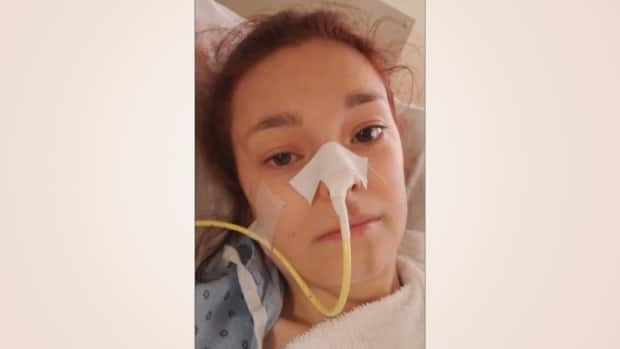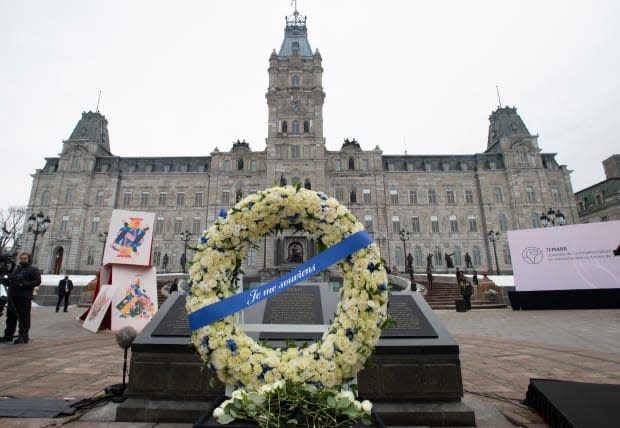Hospitalized mom, 24, pleads with Quebecers to take pandemic seriously

Roxane Smith never thought that, as a 24-year-old, she would even catch COVID-19, but after 11 days in hospital with a feeding tube in her nose, the young mother of three is begging Quebec residents to take the pandemic seriously.
"They say COVID just affects super-sick people or super-old people," she told Radio-Canada through Skype.
"I never thought it would go this far."
It all started on the last day of March, she said.
"I was really, really not feeling well. Small chest pains, palpitations, fatigue," Smith said. "I went to the hospital."
Once hospitalized, her health quickly deteriorated. She had a fever and was no longer eating, but was vomiting and suffering from gastrointestinal distress. She was bedridden by April 1, and the feeding tube was inserted two days later.
Smith no longer has the strength to walk. Even the short distance to the bathroom is too much and she expects to stay in Quebec City's l'Hôpital de l'Enfant-Jésus for another two weeks.
"We just have to wait for the COVID to go away," she said. "And it can really take a long time."
She says she's worried about her education. Missing so many days of school will set her back. She tries to study but says she struggles to breathe and is so tired that it is impossible to focus.
Just getting out of bed, she says, feels like running a marathon.
She will be off work for a few months, she suspects, but she will still have bills to pay.
"So it's not just 10 days in the hospital and it's over," she said.
Respected the rules
Smith once believed that the government and public health officials erred on the side of caution.
"I thought for a long time that maybe there was a bit of exaggeration, that it wasn't as bad as they said. People I know have had COVID without symptoms, so I was in doubt," Smith said.
But despite those feelings, she respected the public health rules, she said. And now she can't even video chat with her children because she doesn't want them to see her with a tube in her nose.
"It's been 11 days since I've seen my three children," she said.
But Smith said she wants people to see the situation she is in — to realize the health measures are in place for a reason.
"Right now there are plenty of people protesting, breaking the rules, saying COVID is a government ploy," Smith said.
"Then there is me, who has been in the hospital for 11 days, who will not be out for a good two weeks, who is crying and wondering, why me? Why isn't it someone who did not follow the rules?"

'Russian roulette'
Since the start of the pandemic, nearly 19 per cent of COVID-19 cases in Canada are young people between the ages of 20 and 29. The group accounts for 3.3 per cent of hospitalizations due to the coronavirus.
"According to doctors, I was just unlucky in the COVID lottery," said Smith.
She says it should serve as a reminder to those who break health rules — there's little to gain and a lot to lose.
Dr. François Marquis, head of intensive care at Maisonneuve-Rosemont hospital in Montreal, agrees with Smith's conclusions about her medical "bad luck."
According to Marquis, people arriving at the hospital are, on average, about 10 to 15 years younger than those who needed medical care for COVID-19 earlier in the pandemic.
"We are starting to see what was very unlikely during the first wave — 30- or 40-year-olds without any previous medical history, people in good health,'' Marquis said.
"They're not seeing a doctor, they're not taking any kind of medication, they don't have diabetes, they don't have high blood pressure. They just get sick.''
Marquis said there are health conditions that make certain people more vulnerable to COVID-19, but overall, it is "very similar to a Russian roulette."

